#ALL casters work for their magic. that’s how leveling up works
Text
Want to know my spiciest d&d take as someone who introduces a lot of people to the game?
Classes (and subclasses) should be rated for complexity, and newer players should be steered away from overly complex options so that they're not asked to do double or triple the work of memorization of other players. This is especially true if the player is going to be slower to pick up on game mechanics, be they young, old, or simply not someone who's very experienced with games in general.
Think about it this way: everyone at the table is expected to learn the base game (what dice to roll, how to pilot their character by talking, actions in combat), some of which is written down but the rest being vibes based and mostly communicated through gentle coaching by the DM. On top of that a portion of your players are going to have to learn how spells work, effectively doubling or trippling their early game class features. This is to say nothing of druids, who not only have to learn all the base features and spells but also have to keep several different statblocks on hand when it comes time to turn into animals/summon familiars. If you have my luck, it's always going to be the shyest/most anxious player at the table who selects the most complicated class, paradoxically meaning the player who's least likely to ask for help is usually in most need of it.
I'm not saying we should restrict all new players to only playing vanilla human champion fighters, but I think a level of oversight is absolutely necessary when guiding new folks into the game. Consider running a trial adventure that's limited to martial classes, introducing a few magic items half way through to give them a taste of what spellcasting could be like.
Forget about the traditional Tank/dps/expert/support/caster party balance, that shit is for experienced players who know what they're doing.
333 notes
·
View notes
Text
“Unlike warlocks and sorcerers, wizards actually work for their magic” unless higher education is free and open to all in your universe, that just means a wizard’s powers come from having the financial resources and upper class backing to attend university in the first place.
#dnd#dnd wizards#to be clear I have nothing against wizards#but wizards who get snooty about how much better they are need to be taken down a peg or two#ALL casters work for their magic. that’s how leveling up works#the only difference is the source
114 notes
·
View notes
Note
Where do the overblotters get their magical girl transformation from? Like does the blot just turn into fabric, not to mention that they look kinda stylish
[The manga images in this post come from Turtle Soup Scans! Please support the team and the work they do!]
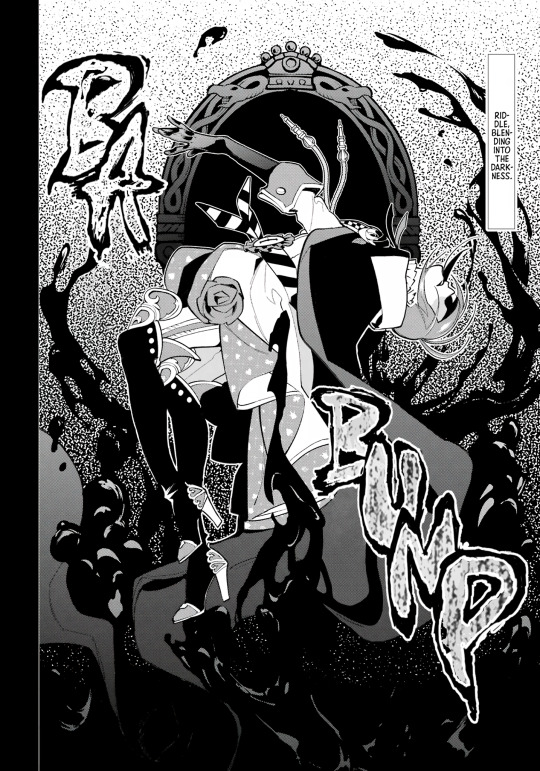
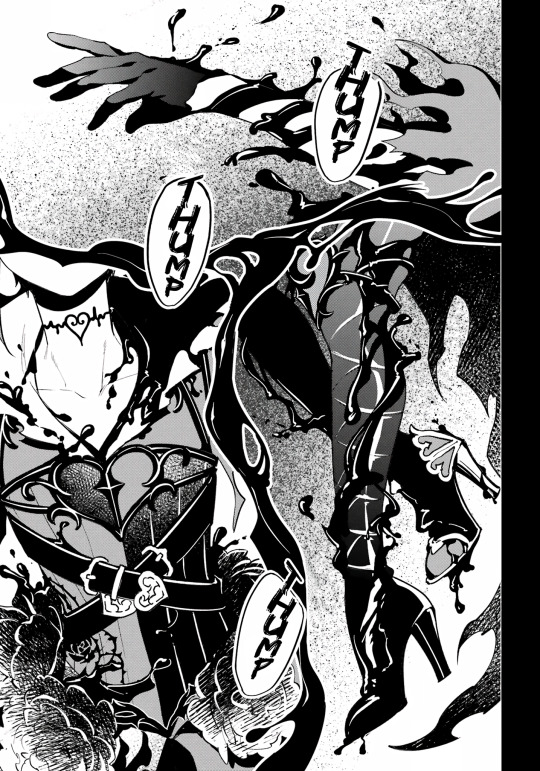




I do believe the clothes that each Overblot character wears comes from their blot; it's more easily seen in chapter 16 of the Episode of Heartslabyul manga. Notice how it looks like the blot it not only swallowing Riddle up, but also dripping down to form various accessories including his crown and choker.
I assume the same occurs for the other Overblots, as they all have similar looks and bits of blot coming from their outfits. You can take a look for yourself below; take note that in many instances you can see blot webbing over their skin, blot collecting as goopy accessories or collars, blot as fabric trains and skirts, blot dripping from their shoes, etc. In book 6, it is explained that you must separate the Overblotter from their Phantom in order to snap them out of OB, so it's likely that the new look comes from the Phantom, a manifestation of the caster's blot, and their connection to the mage.
... Anyway, not sure why the blot decided to make their outfits look that way (I personally would not call it stylish)?? But I assume that it's because the blot is the byproduct of the caster's own magic, so whatever design the blot and Phantom manifests as must represent the mage's personality and/or trauma. For example, Riddle hangs suspended by his own Phantom as though he were a puppet on strings; this may refer to his mother's control over his life. This would also explain the often stitched or torn up aesthetic of OBs, it shows us how broken the host is. (Of course, on a meta level, the OB forms more closely resemble each boy's respective Great Seven parallel.)
***Spoilers for all 7 full body Overblot designs below the cut!!***

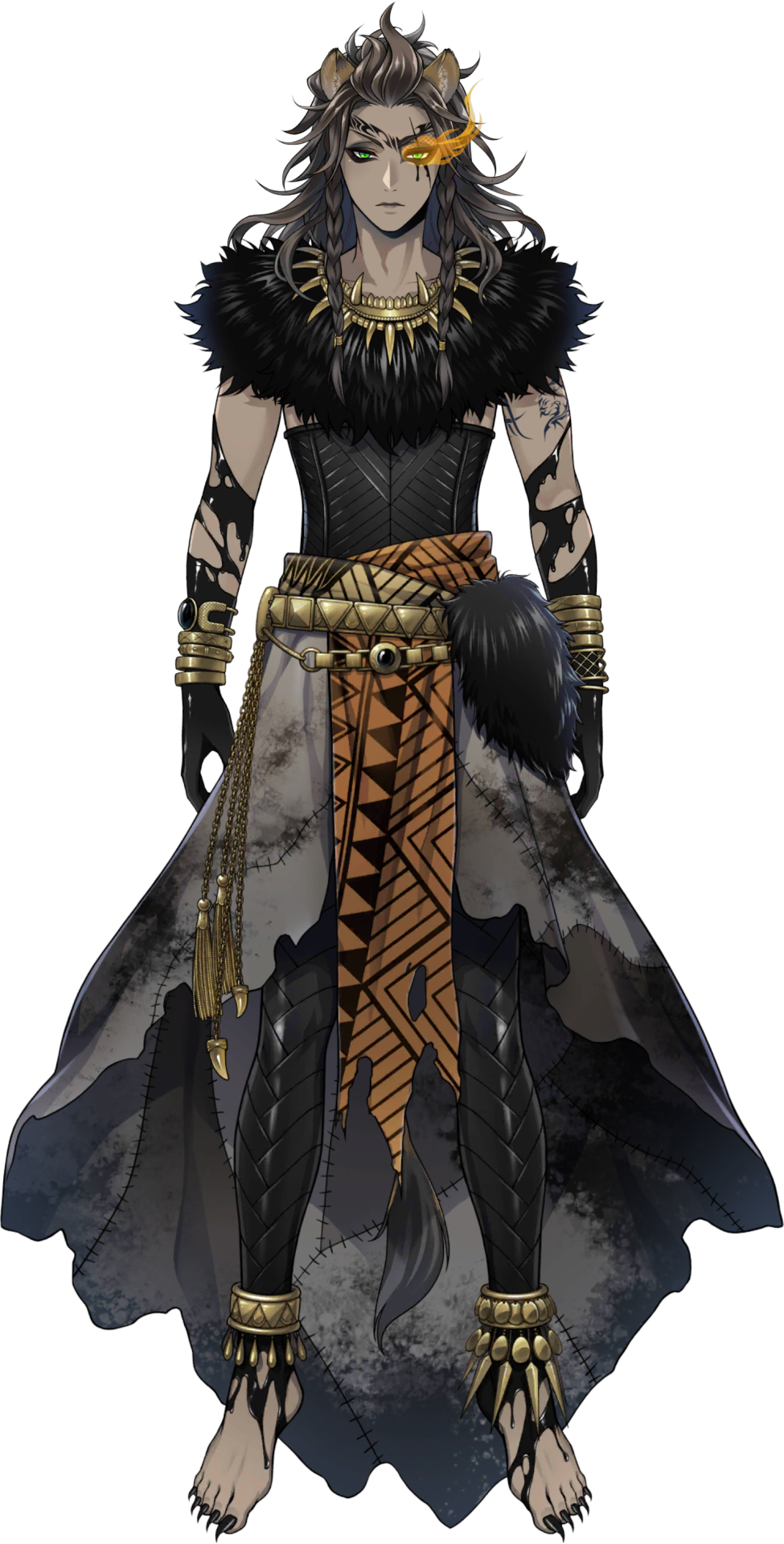
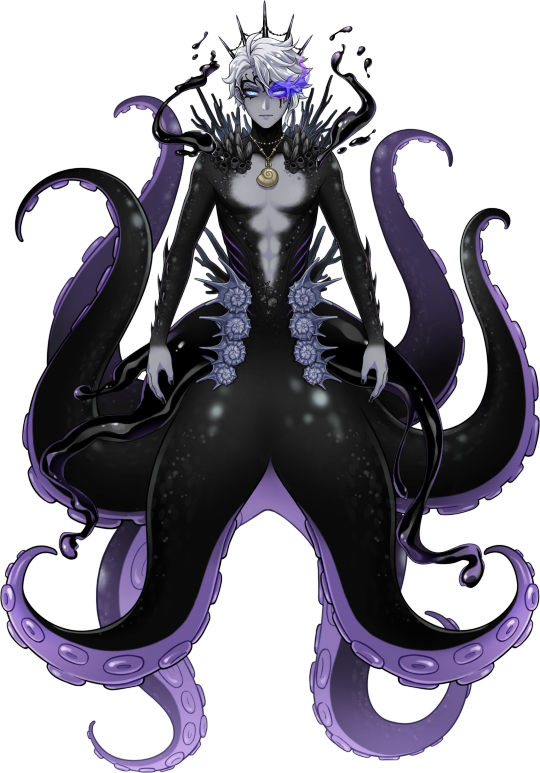
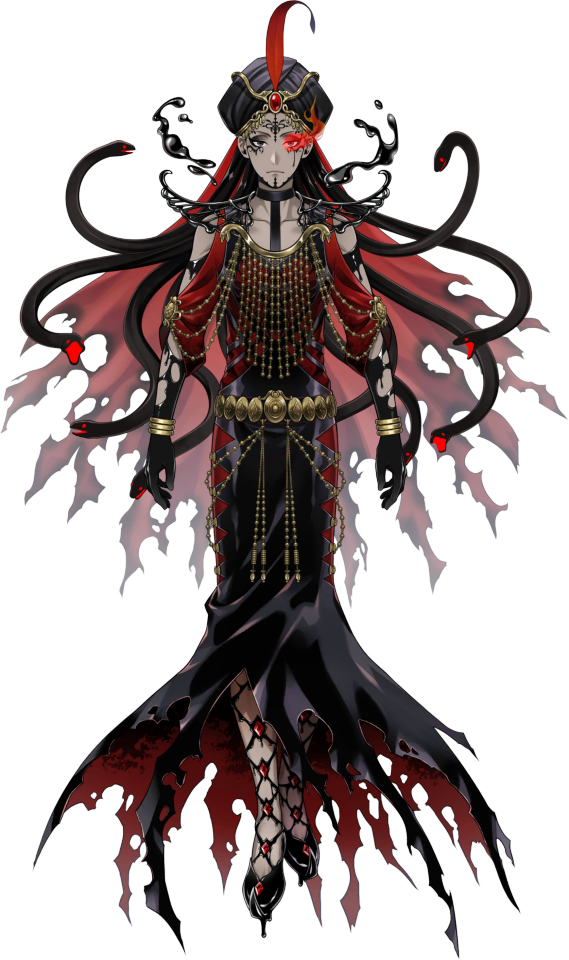

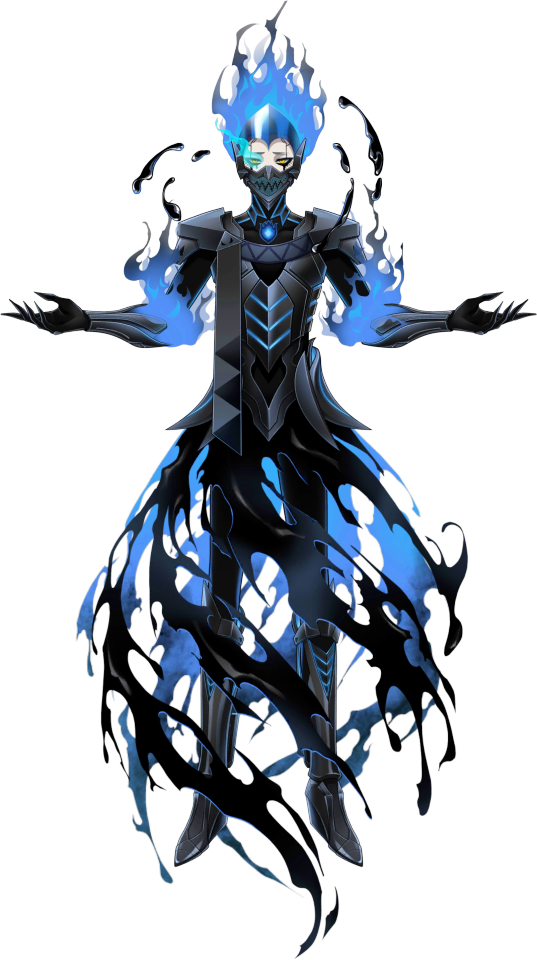

#twst#twisted wonderland#Malleus Draconia#Leona Kingscholar#Azul Ashengrotto#Riddle Rosehearts#Jamil Viper#Vil Schoenheit#Idia Shroud#disney twisted wonderland#disney twst#spoilers#notes from the writing raven#question#twst manga#twisted wonderland manga#episode of heartslabyul#episode of heartslabyul manga
463 notes
·
View notes
Text
"how do you play a warlock in Pathfinder 2e" - fortunately, and unfortunately, the answer is perhaps fivefold I'd argue, depending on WHAT precisely about the warlock you find appealing: witch, thaumaturge, magus, psychic or oracle.
The PF2E witch is a full spellcaster using intelligence - but they rely on a patron who gives them their spells via a special familiar. Definitely Pact of the Chain warlock vibes. However, way more powerful spellcasting then a 5e warlock, more equivalent to a wizard.
The thaumaturge has strong occult vibes, focused on "esoterica" - magical scraps and relics that empower special abilities. No patron, technically not spellcasting, but a Charisma-based occult magic user that looks sick as hell. Does seem a bit Hexbladey though, given armor and weapon proficiencies and capacity for melee combat.
The magus similarly is a strong melee combatant, with limited spellcasting much more akin to how the warlock pact slots work in 5e (though Intelligence based). They can use spells to empower their weapon strikes, and they can only cast at their highest two spell levels available (though unlike the warlock, these levels go all the way to 9)
If the thing you like most about the warlock is being able to build a mass murderer around a cantrip, the psychic might be right for you. One of their cool base class features is additional psychic-only cantrips, which you can then "amp" for more power and utility.
The oracle, like the thaumaturge, shares more flavor than mechanics with the warlock, and is probably the weakest case for equivalency in this post. They're charisma casters with divine spells, but unlike clerics their power isn't from a god, but rather a "mystery". One of their key features is a curse, which as it's strengthened provides both power and drawbacks. The curse mechanics feel very eldritch.
ANYWAY at first glance I was like "wtf no warlock, that seems like a missed opportunity" but no, Paizo was like "how do you like your warlock?" and served you up a buffet.
Visit Archives of Nethys if you're interested!
#ttrpg#pathfinder witch#pathfinder magus#pathfinder thaumaturge#pathfinder psychic#pathfinder oracle#pathfinder#pathfinder 2e#warlock dnd#dnd 5e
256 notes
·
View notes
Text
One of the writing challenges I face is simply magic that makes narrative sense in EGS, but would be utter nonsense in a stricter, more “realistic” magic system.
Like, a spell that makes books with titles starting with “The” appear to glow to the caster. That’s it. That’s all that it does.
What are the mechanisms of this? Why can’t the spell do other things? How would it even know the title of a book? A title is something we give a book, not an innate property that can be detected outside of reading the cover, AND YET, this spell works even on damaged books without covers?! You can’t even use the classic “many mortals assigning its name meaning” excuse, because it applies to every copy of every book!
HOW DOES ANY OF IT WORK?!
The answer is quite literally “because magic,” and it’s not even a snarky, “I don’t have to explain it” sort of thing. It’s a “magic perceives reality differently” thing, meaning the nonsense it gets up to makes sense on some level, but is contrary to how we experience reality.
Which means I occasionally think of a spell, and overthink the mechanics of it from entirely the wrong angle.
Like, yes, OF COURSE it doesn’t make sense when looked at from that angle. Tilt your head the other way, DAN.
126 notes
·
View notes
Text
Fragments - episodes 36-40 author notes
You can find similar breakdown posts on older episodes in my pinned!
I didn’t need to spend so much screentime on Titania fight, yet it was a fun personal challenge. I’d never written/drawn a cohesive fight scene before. The scripted ingame instances don’t leave much room for imagination, I wanted to stay away from the fourth wall, and make up a more immersive scene. How do you even make it look mildly interesting? You’d think, well, characters will just flail at each other until one of them dies, right?
So yeah the biggest challenge was creating the ebb and flow. What affects Vivi’s actions? Why wouldn’t he just murder Titania like any other opponent, and be done with it? I threw in a generous amount of inner pov (that I previously used very sparingly) and some silly tricks. The stakes are high, yes, it’s a Lightwarden vs WoD encounter, but Titania still retains their playful personality above all else. Vivi's here just to do his job, but he also knows that he's dealing with a fae.
The msq makes Titania stand out among other wardens, I capitalized on that and hc’d that they’re important to Feo Ul, and, by proxy, to Vivi. That instantly provided some emotional stakes, and an answer to why he doesn’t rush to kill them out of the door.
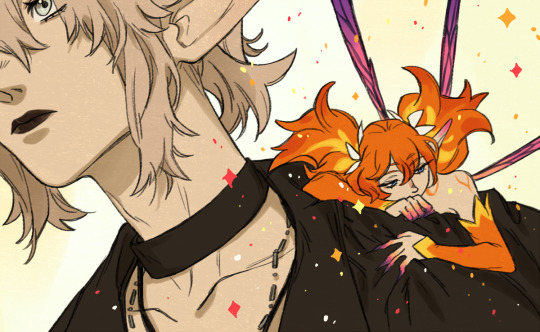
Vivi enters the castle in episode 35, and mostly runs in circles, analyzing his enemy, and even falls victim to illusions. This could’ve been it for him, but I daresay it worried none of us because we’re just at the beginning of a story about this guy, he’s THE guy in this universe not for no reason, he’ll manage.

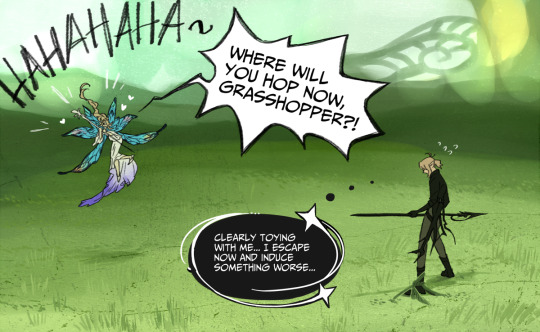
No deep meaning behind "grasshopper", I just thought it's a bizarrely precise descriptor of both Vivi's long legs and dragoon jumps, and it fits the natural theme of the fight.

Vivi didn’t go in unprepared.
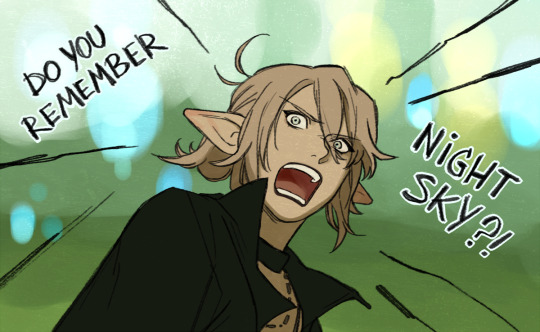
This line will be relevant again in like, 5-7 years from now :’>
More under the cut~

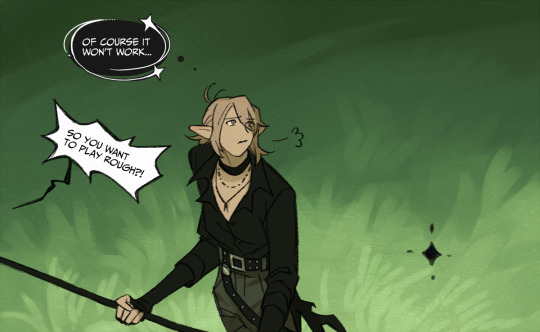
He always, always doubts everything, especially when it comes to his level of power. Self-nerfing. A light (heh) case of an impostor syndrome.

Everyone loved the bonk for meme reasons, Vivi simply bought himself some time to cast.
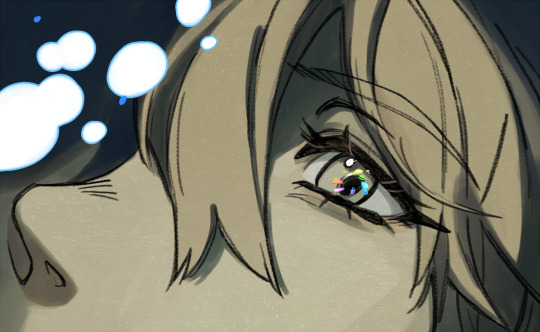
The Rainbow Sparkles of Believing in Yourself! And of something else, perhaps. I’m planting quite a bit of stuff for future, this one should take a mere year or so to pay off.
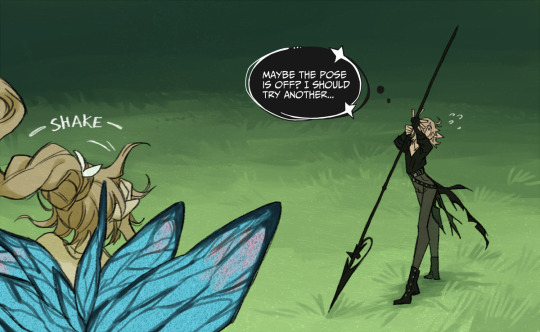
I hope this pose’s enough of a hint that you shouldn't be taking episode 37 too seriously.
Yes, he used his spear to ~cast~. And took a sailormoon pose. This's his, monoclass dragoon’s, interpretation of what the caster magic’s probably like.

Offscreen, Titania comes to their senses and shrills “so you wanna play rough?!���, Vivi ignores them, concerned with only one thing: did he succeed? How did the test of his custom spell go?

It only worked out because the both of them are idiots.
I like to emphasize that Fragments isn’t about retelling the msq, or big epic battles, but here, where I actually put my heart into it, I feel like I managed to pull off at least one epic beat you’d typically see in an action-focused comic. Super proud of this panel ;w;

This’s a standard panel divider I’ve used multiple times before, but it couldn’t be more visually appropriate here :3c
So, to recap. Vivi asks Titania if they miss the night sky. They do. Vivi brings the night sky to them, and lo, something actually happens. I illustrated this “something” as one of their eyes getting sort of cleansed here. This story suddenly takes a mahou shoujo (shounen, heh) turn, I appreciate that it may cause some eyebrows to raise, but I think it’s okay to take creative liberties like this in a story themed around identity, agency, and believing in yourself. If Titania’s so strong as to retain a tiny bit of their old self, to cohesively partake in a simple convo, then why can’t they return, even if for a brief moment, given the proper assistance.

An appropriate reaction to the wild bs that’s going on. Imagine inventing the tale of WoD in the First, only to witness THIS.
As about Vivi, he can save a soul when he genuinely cares for it. We haven’t seen him do this before. He does it for Feo Ul explicitly, implicitly as a self-reflection. He’s projecting so hard after realizing that Titania looks like him. He wishes for them what he'd wish for himself: to rest, to be treated with care and consideration. They don't only look like him, they're also unfree, tortured by something. Empathy or not, this’s the kindest fight Vivi’s ever fought.

I’m iffy about the canon talents that come with the Echo. You can understand any sentient creature, okay. What happens when you speak, does the other party feel the difference between that soulspeak and their native tongue? Does it feel off? Does it offend? I incorporated my own misgivings into Vivi’s thoughts about his Echo. He doesn't use soulspeak here out of respect and concern that Titania might not react well to it, throwing the entire plan out of the window. Thus he memorized quite a bit of fae words before the fight. This’s his way to mark himself as one of their people, or at least to show that he truly cares.
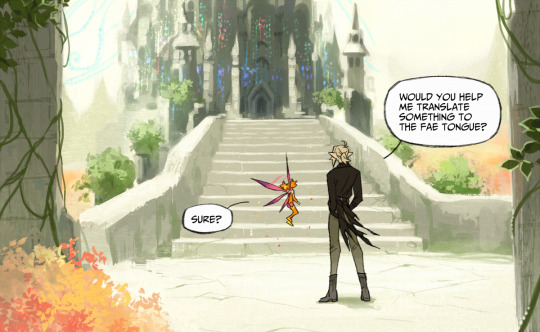

STAY TUNED FOR EPISODE 41
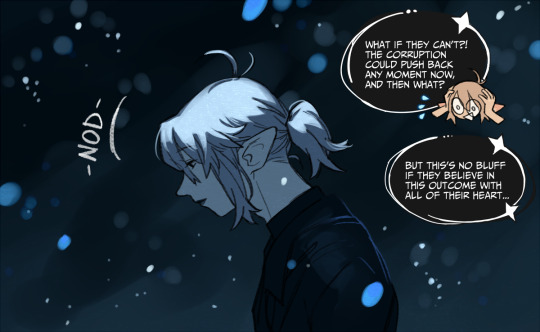
Vivien Doubter Rell. Also yay first nod!
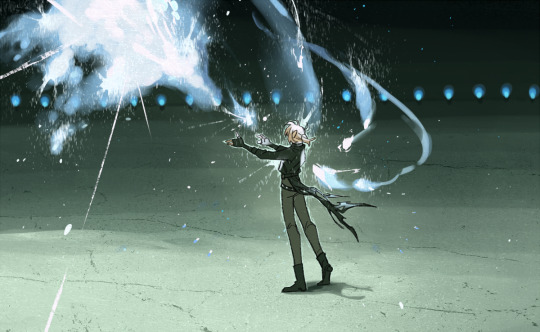
Embracing his new duty, and possibly giving Titania the hug they deserve.

Look HE’S OKAY. For now. I just thought the hiccup would be a cute way to acknowledge the terrible power he’s just absorbed. The canon cutscene moves on unblinking, but here’s different.

Bracing himself for confrontation. Things might go awry. Or might not. Vivi doesn't know. Worst case scenario: this’s the end of his sweet lil friendship with Feo Ul. Do they like him, or a Titania-lookalike in him?
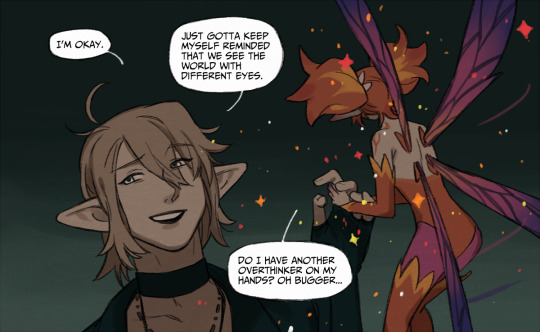
“Oh bugger...” big pets come with big responsibilities, my dear Feo Ul.
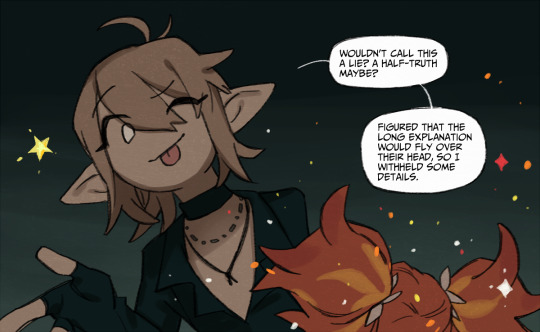
Just to reinforce his fae-ness.
Vivi had full control in this fight. Analyzed the enemy, successfully tested some crazy tricks, managed to have a heart-to-heart that resulted in getting a permission to kill Titania not with violence, but with mercy. So much could’ve gone wrong, but just didn’t. Vivi’s used to this, even if he constantly doubts everything, this’s how it always goes. He’s being flung at tasks with abysmal odds, somehow he emerges victorious.

I just like this panel so much okay.
This arc may feel slow, but it gives depth to Vivi and Feo Ul's relationship, and seeing them together in later episodes will spark even more joy.

Even after a warm moment they’d just shared, Vivi’s still wary. I broke out an analysis of what external influence, pressure to change means to him, please read this post if you missed it. YEAH TAGS AS WELL.
His expression here is an attempt to downplay the anxiety and swing the odds in his favor. What if Feo Ul insists and throws a tantrum? What if he has to become Titania right now, and there’s no way around this? Let’s make puppy eyes just incase, maybe that helps.
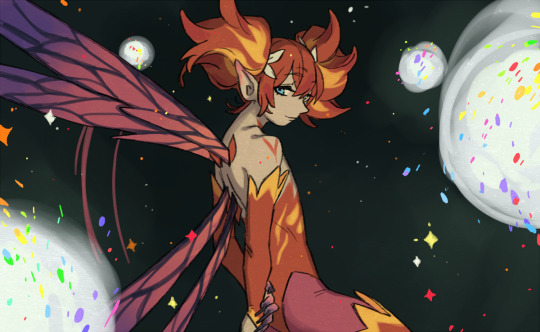
One more personal fav panel. There’s SO MUCH in this look. They’re on a threshold, about to become something else on Vivi’s behalf. Because they love him so much. They’ve instantly become friends because they don’t want anything from each other, just the company. Feo Ul’s such a breath of fresh air for Vivi, a new hope in a new world, where he’s (comparatively) a nobody, where people still have the potential to love him for who he is as a person. This’s why our crimson pixie gets so much screentime.


Vivi really said XD
The next few episodes wrap up the Il Mheg arc, and focus on good vibes and celebration. ShB follows a rollercoaster formula where it makes you smile at something nice and sweet only to whack you in the face right after, and I’m trying to do the same :3c
As always, thanks for reading~
79 notes
·
View notes
Text
Myr (Monsters)
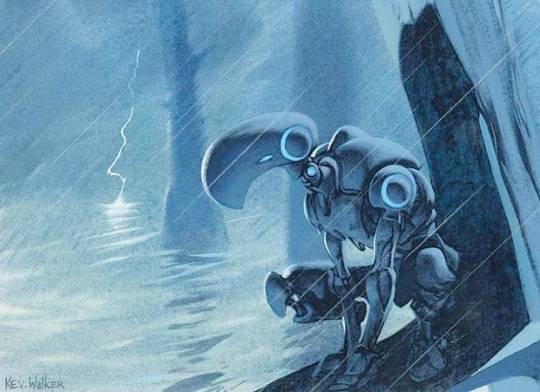
(Silver Myr by Kev Walker)
(I FUCKING LOVE MYR! They're cute, they're iconic, they're interesting bits of worldbuilding... I HAD to make 'em! Mercifully, I've separated Mirrodin from New Phyrexia, and created the Plane of Steel, a fun little plot hook roughly referencing Mirrodin's creation. If you want to make these native to the Plane of Metal- new to PF2- or simply old machines of a dead culture, feel free.
Also, this will contain rules for Mana Myr, which I spiraled off the five colors of Magic, but expect more myr in the future!)
Myr are mysterious creatures native to the Plane of Steel, an artificial plane ripped from the Plane of Earth and turned into a vast network of self-sustaining machines. Myr themselves are the most common denizens of the plane, servitors to an unknown master and performing upkeep on their more complicated cohabitants.
Myr have been imported from the Plane of Steel in rare quantities, and serve as a rare treasure on the Material Plane, loyal servants infused with magical energy. Some, however, fear inviting such mysterious creatures into their homes, especially paranoid wizards and watchful politicians, as it's a known fact that myr are vulnerable to scrying- and it's a distinct possibility that their master is still watching.
Myr are unique among constructs in being easily repairable once slain. Upon reaching 0 health, a construct with the Myr subtype is not destroyed; rather, it turns inactive, and will reactivate upon being returned to positive hit points. However, a myr that reaches -20hp is destroyed as usual. Additionally, the knowledge of how to create myr has been lost or well-hidden, and they lack rules for construction. Fortunately for myr, they are capable of reproducing themselves, although attempts to study how they do so have not succeeded in creating animate constructs.
There are thousands of different kinds of myr, most being only slight modifications on a basic design; what is presented are some common archetypes and a few notable variations.
Mana Myr
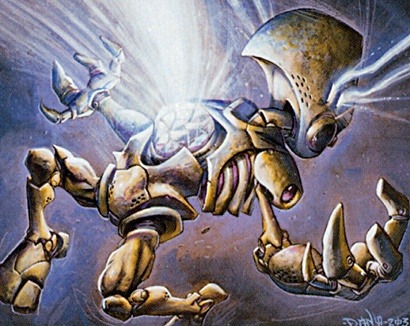
(Myr Moonvessel by Danny Orizio)
Among the most common servitor myr, mana myr work on the machinery that makes up the bulk of the Plane of Metal, and these servitors are attuned to one of the eight schools of magic. Of the myr of the plane, it is the mana myr who are most desired, and those who find themselves in possession of multiple, or let them reproduce, sell them for exorbitant prices.
Each school of magic produces a myr of a different color. Even though they are all made of the same substance, the magic forged into their bodies makes them appear as one of a variety of colors; the mana myr of each school of magic is named after a metal or mineral it resembles.
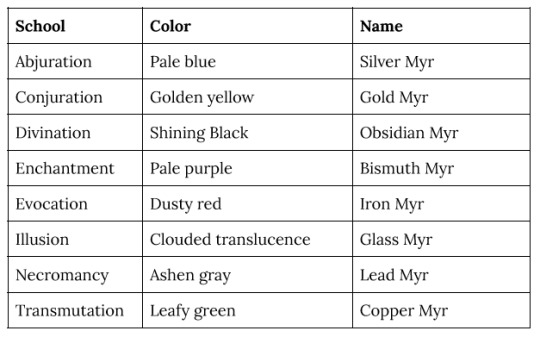
This small humanoid construct has a strange head shaped like a heavy beak. It resonates with magical energy.
Misc- CR1 LN Small Construct (Myr) HD2 Init:+2 Senses: Perception:+3
Stats- Str:8(-1) Dex:15(+2) Con:- Int:4(-3) Wis:14(+2) Cha:14(+2) BAB:+2 Space:2.5ft Reach:0ft
Defense- HP:21(2d10+10) AC:13(+1 Size, +2 Dexterity) Fort:- Ref:+4 Will:+2 CMD:13 Special Defenses: Construct traits
Offense- Slam +2(1d3-1) CMB:+0 Speed:25ft Special Attacks:
Feats- Lightning Reflexes
Skills- Perception +3, Spellcraft +0
Spell-like Abilities-
Share Memory /at-will
Make Whole 1/day
Special Qualities- Mana Servant, Scrying Focus
Ecology- Environment- Any Languages- Common (Can’t speak) Organization- Solitary Treasure- None
Special Abilities- Mana Servant- A mana myr is designed as a vessel for magic. When created, it is infused with magic from one of the eight schools of magic. When used as a focus to cast a spell of that school, the spell is cast at a +1 caster level and with a +1 DC. A mana myr registers as strong magic of its school when viewed through Detect Magic or similar spells. Scrying Focus- Myr are perfect vessels for scrying on. They get a -5 penalty to saves against spells with the Scrying descriptor, and magical sensors made to scry on a myr and its surroundings get a +5 bonus against rolls to perceive it. Additionally, myr- and any object or creature they are in contact with- are not protected by spells such as Nondetection and Screen.
60 notes
·
View notes
Text
Reviewing every rpg book on my shelf: 1, Dungeon Crawl Classics
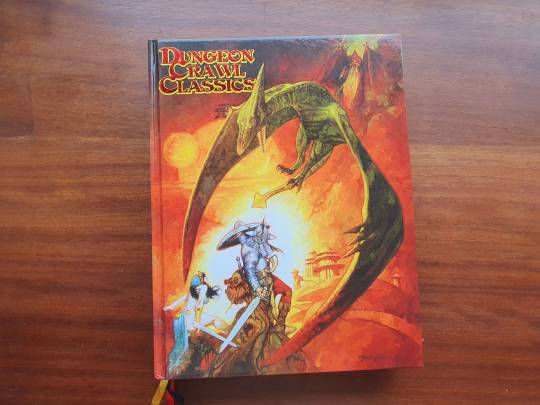
Everything about this game is absolutely dripping with bonkers maximalist bombast that makes me excited to play. To start with book itself is nearly 2 inches thick. Is that practical? No! does it feel like you've got an ancient tome full of roleplaying possibilities? Absolutely.
In a world tending towards minimalism and 'polished' production its so good to have somthing thats just big and fun and unapologetic about not being what it is.
DCC's dice are a microcosm of everything great about it. Not only do they come in shapes they never taught you about in maths class but they also all come with a fun little bonus. One of my sets comes with a stat block for a monster, while the other has a ridiculous table of reality warping effects on which you roll ALL the dice in the set, and inevitably send your campaign careening off into madness. (and it has a frame story about a stoner wizard in a magic van).
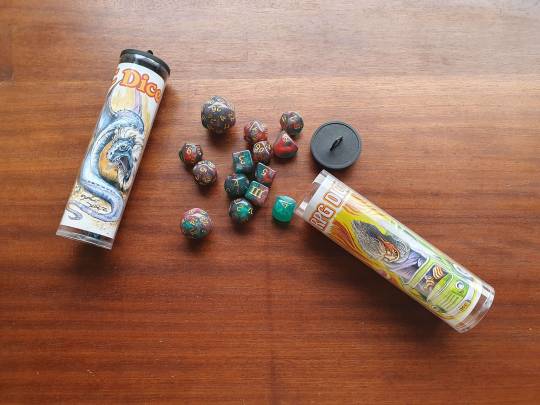
And then there's the actual contents of the book, which is probably about 80% spells and ridiculous tables. And the spells are just so good. Each one takes up a a least a full page on average and gives a range of results according to how well you roll, from 'it missfires and things go horribly wrong' at the bottom, through 'it does about what you would expect' in the middle result ranges, to 'actually, this is almost too much' if you manage to get a roll in the 30s.
Alongside being sick as hell, this also has a satisfying effect of keeping low level spells relevent and interesting as their effects scale with the strength of the caster on a variety of axis.
related to spells is the 'spell duel' procedure. I have no idea how well it runs at the table, but the idea that when two (or more) wizards fight their spells can interact and you can use any appropriate spell to try and counter another spell is so increadibly compelling.
Ok, enough gushing about vibes. what about actually playing? So far what I have run is the 'level-0 funnel', which is probably what you have heard about if you have heard anything about DCC. The premise is simple: randomly generate 2-4 level-0 peasants for each player, send them into a dungeon, and then take whoever survives and level them up to become your characters for a campaign.
Not only does these lead to much hilarity as a mob of townsfolk bungle their way through danger but also really fun problem solving as the players work out how best to navigate problems with a shoehorn, a bundle of wood and a live chicken.
Specifically, what I have run is Sailors on the Starless Sea, which is correctly recognised as THE introductory module to use. Its a nice sequence of somewhat open investigation followed by a excellend sequence of bombastic set pieces, all the while giving the players lots of scope to come at things ininteresting ways. It can get a bit unwiedly trying to manage such large number of characters when they do run into combat but if you plan ahead a bit and use various tricks (it would be useful is more of that advice was in the book rather than coming from forums) it is manageable.
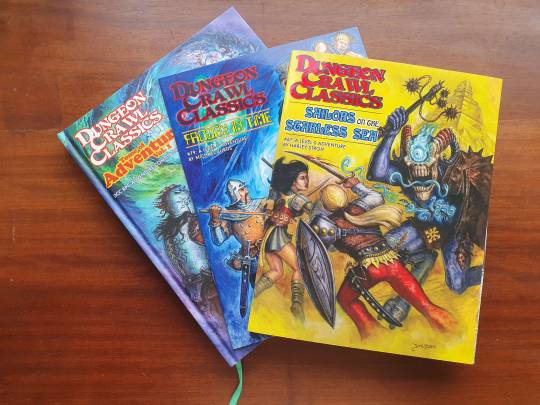
And to return to vibes one last time: the art in these books is just so good. We could not be further from the slightly stiff generic highly rendered fantasy art of wotc era d&d. Its all fantastically old school fantasy, so full of character, and just the right amount of rough around the edges. My only slight complaint is that this does include a little too much of old school fantasy art's treatment of women than I would like...There are still prenty of sensibly dressed women and i'm not about to decree that no sexy fantasy women are allowed but the dial is a little further in a direction of objectification that I would like.
75 notes
·
View notes
Text
This is petty but that's never stopped me.
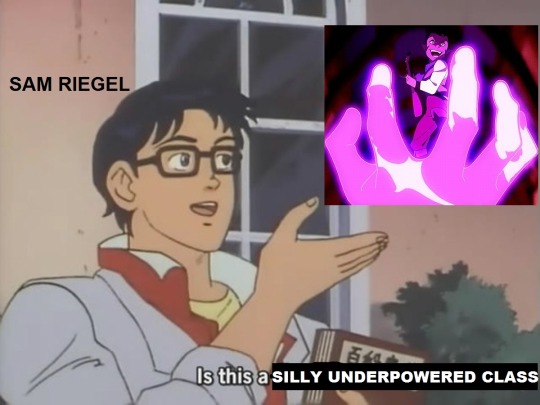
In the Vox Machina campaign, Scanlan Shorthalt's resounding success in matters of tactics [this post isn't about roleplaying] was partly due to Sam Riegel's skill, and mostly due to the fact that 5e Bards are just that good. However! The "gnome bard" combo was famously chosen by Liam, after Sam, who'd never played d&d before, asked what's the silliest, least powerful and least badass thing he could play. That was his character concept. And at the time, Liam was not wrong to answer "bard". In 3rd Edition/Pathfinder, Bards DID suck, at least out of the box. You could build a strong Bard in Pathfinder, but you had to optimise to high heavens with carefully selected feats and spells and items from various sources. It didn't just happen spontaneously, and it was still nowhere near the raw power and versatility of a Wizard or Druid. Bards played support.
So at lvl 9, they started streaming and switched from Pathfinder to D&D 5e. Scanlan got an ENORMOUS power boost at that point, but Sam was still harbouring under the impression that his chosen class is not powerful or badass at all. And as they kept playing and he kept killing it (he was brilliant at it, no doubt about that!), he presumed that he was killing it with one hand tied behind his back, because he was just a silly little gnome bard. And, he emphatically wasn't silly. He was a whole-ass full caster, top tier class right there.
Pathfinder Bards are half-casters. If they hadn't switched to 5e, Scanlan wouldn't have access to 7th and higher level spells: no Mordenkeinen's Magnificent Mansion (a signature spell), no Dominate Monster (this is how he made the goristro fight Vorugal), no Reverse Gravity (big moment in the first Ripley fight), and no Wish (kind of a big deal!). Other spells aren't in the Bard list, and there's no Magical Secrets in Pathfinder: he wouldn't have access to Bigby's Hand (another signature spell), Otiluke's Resilient Sphere (how he got rid of the efrit, and Ripley), Lightning Bolt and Stinking Cloud (his standard damage spells), Polymorph (that's several giant eagles including the "now smarter" Grog (this will never stop being funny), and of course the legendary triceratops), or Counterspell (kind of an enormous deal). And all the other spells would have come later: no Seeming at lvl 11 = no cows. (What a loss! No cows!)
And it's not just access to spells, it's also "likelihood of spells to work", which depends on the DC, which in Pathfinder depended on spell level. Lower level spells had a lower chance of doing anything, by virtue of being easier to resist. And half-casters got a slower spell progression, and ended up with significantly less power overall. Whereas in 5e spell level is irrelevant, spell DCs depend on your character level, and that's that. Even (Bardic) Inspiration got a boost from the switch. All in all, we're talking about a spectacular upgrade.
So a tragic misconception happened: Sam got it into his head that he's so good at d&d that he can gimp himself and still kick ass. Well, he can't.
When he played a Rogue (no big spells, huh? no cheat sheet!) he sucked at it and he hated it. And now that he plays a Cleric and actually, actively gimps himself (he said in a 4-Sided Dive that he deliberately avoids cleric spells that others have used before in CR, which by now is most of them, and certainly the best of them), he very predictably sucks at it too (I mean relatively speaking; it's still a full caster), and he doesn't love it. The one time he was BRILLIANT was when he had a top tier class to work with, and used it to its full potential. But he thought he was gimping himself, because he was thinking of a different game/edition than the one he was playing!
I wanna grab him by the shoulders and shake him up and say my good man, you gotta stop this "I gimp myself" -> "I fail to kick ass" -> *surprised pikachu face*. CHOOSE. Either gimp yourself and accept you won't be kicking any ass, but it's okay because you enjoy roleplaying someone like that more than you enjoy kicking ass, OR stop gimping yourself and kick ass, because you do enjoy kicking ass, don't you?
Both are great! I approve either way! But choose.
I also wanna grab Liam by the shoulders and tell him "Wizard or Sorcerer! For the love of all that's green and good in this world, next time Sam asks you what class to play in D&D, tell 'im Wizard or Sorcerer!". But then I remember that next time they'll probably play Daggerheart and not D&D unless WotC makes them an offer they can't refuse, so the whole thing is moot.
86 notes
·
View notes
Text
Daenerys as a D&D character!!
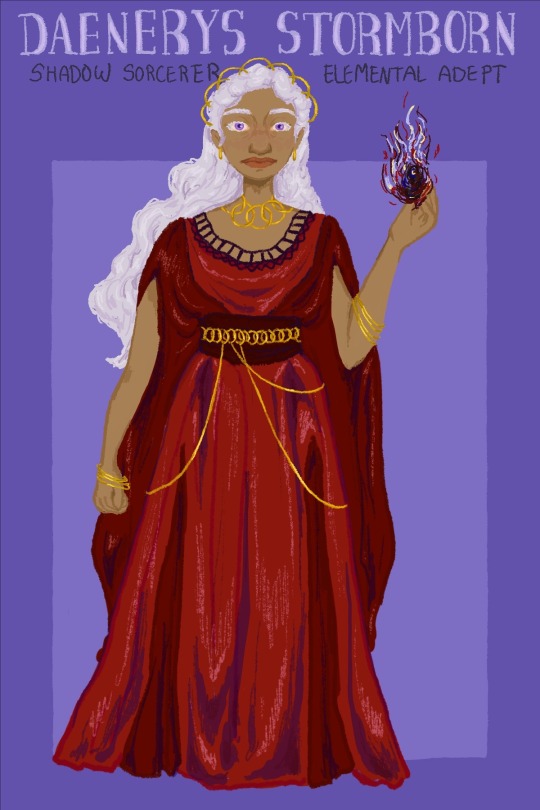
I love dnd to bits, and I spent a lot of time thinking about how certain asoiaf characters would be if they were made using dnd 5e rules. Obviously, i had to start with dany! She is a shadow magic sorcerer, with the elemental adept feat.
My long, winding thought process about dnd and dany is under the cut, in order to spare you all.
I'm kind of working with like, westeros in the forgotten realms as my base concept, since theres elements of both that are needed for this character build to make sense lol.
Sorcerer made the most sense, with how the targaryans are thought to have ancient magic, and since dany is quite charismatic, charisma would be her spellcasting stat. I think that the obvious sorcerer subclass is draconic bloodline, but i disagree, since the way dragons are portrayed in asoiaf doesn't match up with the dnd description of dragons. I could maybe see draconic bloodline sorcery for the Fire and blood characters, but for the "modern" targs, i'd honestly lean toward fire genasi (descendants from genies, with specific elemental powers) ancestry, since the immunity to fire is emphasized. Though technically dnd doesn't really work like that, i think as a character dany would be a fire genasi (though without the usual visual traits, i suppose)
since i elected against draconic bloodline, the sorcerer subclass that makes sense for daenerys is shadow magic! its maybe a bit on the creepy/edgy side, but i think aspects work well for dany's life. for starters, if you think of her gaining magic during her life, the deal she made to try and save khal drogo's life would be perfect timing for darker magic to make its home within her. however if you wanted her to have magic from birth, then the dramatic circumstances around her birth could be heightened by there having been shadowfell influences around. also!! at 6th level, shadow sorcerers can summon a "hound of ill omen" which can take any shape, and could easily be a small dragon.
The last aspect of why i chose sorcerer, is that while the spell casting sucks at lower levels, it then really gets good as you gain spell slots (limited per day and necessary to cast any spells) and sorcery points. the spell list for sorcerer is full of damage dealing spells, and dany kinda reads as a glass canon to me (i love sorcerers a lot but they are fragile). I did briefly ponder divination wizard, since daenerys seems to have an inclination toward being a dreamer, but i don't think she had time to study and practice wizardry in her chaotic childhood. whereas we see as she gains power and confidence while growing up, and sorcerer works well with that
last few details! i've portrayed her as higher level here, which is why she is so fancy. since she is upper level (in this i was thinking around 14th), she would have access to feats, and i definitely think fire elemental adept (gives bonuses to spells that do fire damage) would bring back some of the draconic aspects to her spellcasting. for metamagic options, obviously twinned spell (allows a spell that targets 1 person to be twinned to hit two people) cause its the best one, but i was also thinking subtle spell (allows a spell to be cast without speaking or moving) since it would be quite helpful for her. For other potential feats; inspiring leader (bonuses when you give speeches n stuff) and war caster (allows magic to be used better during combat) both make sense. For her stats, i was thinking in order of highest to lowest; charisma, wisdom, intelligence, constitution, dexterity, strength. Maybe i'm doing her a disservice by having her physical stats be her low ones, but i think her mental stats are just stronger.
Anyways if you actually read all this i love you and please message me any opinions you have about dnd/asoiaf
#my art#digital art#illustration#asoif fanart#fanart#digital fanart#asoiaf girls#asoif/got#daenerys targaryen#daenerys fanart#daenerys stormborn#dnd art#dnd 5e#valyrianscrolls#shadow sorcerer#dnd sorcerer#dnd character
77 notes
·
View notes
Note
You know, with your evil woman thing I was expecting Dorothy to be sinister, not Magical Mouse Otacon. "I created a dream network to free us from our chains! It's also a Castrophe-strength Caster!" "...why that last part?" "Why not?" Girl has endless goodwill and no concept of military applications.
NO YEAH that is an expertly apt designation: Dorothy is Otacon if Otacon was also a high level Archmage.
You can summarize Silence and Dorothy's "fight" (debate) as
Dorothy: "But with my creation, I can level the playing field for everyone in the world, there'll be no more hardship, the only thing that'll differentiate one from another is their own hard work, not their natural talent!"
Silence: "Okay that's really cool Dorothy but did you ever stop to think why this is all being funded by Really Fucking Shady Dude with Military Connections, while you work at the Morally Bankrupt Labs that have had a hand in literally everything bad that has happened in this country, ever? Also did you notice how another way to use your creation, besides its intended use as a hub for the collective human consciousness, which is, by the way, WITH DUE RESPECT, A BIT CRAZY, can also be used as a giant Arts resonator that can cast Arts with potency on the scale of actual Catastrophes and thus is basically a Catastrophe that can be controlled by human will? Do you REALLY not see how that is a dangerous thing to have? In general? As a whole?"
Dorothy:
Dorothy: *looks behind her to see The Creation warping reality, space, and time*
Dorothy:
Dorothy: "Wait."
Dorothy: "Wait you're right this SUCKS I fucked UP" *unplugs it immediately*
Basically, Dorothy is High Intelligence Low Wisdom build, I love her.
340 notes
·
View notes
Text
Maximianus Philophonos Bard 11/Rogue 1
Because we're at the end of the campaign, I wanted to write up a little bit about Max.
Max started as a combo of two A+ tier ideas:
A charisma caster but the charisma is "the most pathetic little man you've ever seen, you can't possibly say no"
A bard who thought being a bard was like being a professional musician and is shocked to find out that it is not, in fact, at all like being a professional musician.
The other thing going into Max is (before naming him, the name is only accidentally a pun) I wanted to abuse the shit out of the bard class. Minmax that fucker. Dating the DM is an excellent method for getting away with this. Turns out a single level in rogue gets you some expertise (2x proficiency bonus to some skills) which you then get MORE of with bard levels, and eventually bard gets you jack of all trades (1/2 proficiency to anything you're not proficient in) meaning that most of his skill checks are something like +5.
So out of universe I needed a guy whose first level was in rogue, remainder in bard, a classic pathetic little wet rat of a man, who is both wildly talented and also just. Completely incapable of using that for malicious OOC purposes otherwise my wife would kill me.
What I wound up with is someone who has crippling anxiety. Max is very nearly too anxious to function in society, gets outsize sympathy for it, and really can only do social interactions in the framework of performances.
See, at about 18 Max went to magical Juilliard to become first violin in the Requiem City Orchestra. After the first semester he realized two things:
Magical Juliliard is not really Juilliard at all, but more like the CIA academy if they also taught music.
He's trans. (Sidebar: He does not actually have a deadname. Maximianus is his stage performance name that he just sort of. Went with. After coming out.)
This is all hideously awkward and embarrassing and he has multiple fullblown panic attacks about the first thing.
Max's family is huge and overbearing and supportive and he doesn't really want to come out to them because it will be a Whole Thing TM and he is so, so, so bad about receiving affection, and he really doesn't want to tell them about the school mixup because then he's wasted their money and they'll never ever ever say anything about it but he's just a drain on their resources and also everyone will be so caring, so sympathetic, poor kid, homecooked meals for months, mom knocking on the door every day to see if he's still crying--
So he goes no-contact. To avoid explaining why he's dropping out of school.
He did accomplish one thing in that semester though, and that was making friends with a tabaxi student named Ihava (Ihava Nayme, because Jo mistakenly didn't give her a name and we promptly engaged her in conversation and also a subplot). Ihava is a budding revolutionary and realized that (a) Max totally has subversive tendencies and (b) the ability to baldfaced lie to cops and make the cops feel bad for you is priceless.
That's how Max got involved in a budding insurgency, and over the following year or so took his first class in rogue. Some theft, but mostly just skulking around, standing watch for others, passing info, etc.
Then he got itchy feet--Requiem isn't tiny but a year trying to avoid contact with any relatives, your luck will run out eventually, and Max is also just. He's not flighty but he does like novelty, and at some point the Violet Guard were gonna figure out that this kid was turning up at a lot of crime scenes. So he dropped a letter to the family (identity crisis etc graduated early etc going off to join the circus don't worry about me), and really just started moving across the country, working as a travelling minstrel.
He very rarely pays full room & board, instead playing for his dinner. He eventually washed up in Suncrest, and met the rest of the party when the tavern down the street [checks notes] exploded.
And this is where he really started taking off, because Max is two very cool things in one package:
He is just a good kid. When asked by a NPC why we were putting so much effort into helping her, his immediate, honest answer was "how could we not?" and he stands by that 11 levels later. He's somehow remained mostly Lawful Good despite some VERY sketchy actions, because at his core he wants to help people, and he wants to do so within a strict code of morals. They're just...sometimes unusual.
He's also got a VERY nasty imagination and will put his spell list to work in deeply creative (and fucked up) ways.
As an example. At level 4, Max got the second level spell Phantasmal Force, which lets you convince one being that Something Exists. This is obviously a spell mostly constrained by the player's creativity.
Also at level 4 Jo dropped us in a dungeon at the bottom of which was a Young Blue Dragon. This was moderately outleveled for the party and we should have fucked off.
Instead Max went "hey is that a male dragon" and the DM said yes, and Max mindfucked the dragon into thinking there was a Young Red (male) Dragon coming into HIS LAIR, and then the dragon spent multiple rounds trying to fight the illusion and we completely killed a dragon without major injury at level 4.
This became Max's Thing: Using his spell slots to wildly outsize effect, through monopolizing a major enemy, convincing NPCs to let us go where we really should not go, utilizing cold iron + animate objects to do serious damage to the Wild Hunt...
He didn't usually do the most damage and he didn't often get the kill shot, but he was doing battlefield control. A lot.
And so then we come to the final arc. Jo wrote up the bit about the Wish spell here. (I need to add that once again we fucked up her plans, because of COURSE the WIZARD would attune to the STAFF OF THREE WISHES, and no. Consensus was to let Max do it because Max is the words person. This worked out very well, see here.)
But just. You have the world's most anxious bard. He didn't even want to be A Bard, he wanted to be a musician. He also has a mindblowingly powerful artifact.
For over a minute, Max had to maintain perfect concentration to save the world. A friend died in that minute. Multiple friends fell unconscious and had to be revived (mostly by Max). Almost everyone in the party temporarily incapacitated themself (see here) to ensure that he passed Concentration saves he should have failed.
There's a massive battle going on entirely around Max. He is the focal point of everything. Everyone he loves is risking literally everything to keep him focused, and he spends most of it in a pocket dimension trying to keep breathing. He's channelling impossible power to try and fix the converging planes and defeat the Summer Queen, and he can only do this by not fighting, by hiding away and curling up tight and thinking very, very hard.
And he does it. He succeeds. We find out tomorrow what that looks like but god damn I am proud of my boy.
#HE'S SUCH A GOOD#i'm not sorry for putting this massive thing on everyone's dashes y'all deserve it#julis runs d&d
64 notes
·
View notes
Note
Sorry if you've asked this, but if you're not busy can you explain how overblotting works? To my understanding it's basically that you need to use a lot of magic and be in negative state and if you're blotted too long you become a monster, is that correct?


Part of what you said is right, and part of it is wrong 😅 I’ll give you the facts though!!
The most information we get about the state of Overblot comes to us from Crowley in 2-3 and 2-4. Essentially, “blot” is a byproduct of magic. Blot is described as a highly toxic substance that greatly harms one’s mind and body. However, it naturally goes away with time if you eat and sleep properly. Negative emotions are NOT required to form blot; all mages create blot regardless when they use magic), but constant negative emotions can make it easier or faster for blot to accumulate. Additionally, Crowley stresses that the wellbeing and emotional state of a mage plays a significant role on an individual’s magic limit and blot accumulation.
The magestones each mage has serves as both an item that regulates blot + helps to direct magic, as well as a visual indicator of how much blot the magestone holder has at the moment. If the stone is clouded over with black, that means you should probably rest and recuperate before attempting any magic again. It’s still possible to cast spells without a magestone (which is a fact we learn in Vargas Camp), it’s just much riskier to do, as without a magestone, it’s harder to notice how much blot you have—and not only that, but it starts to build in your body instead of in the magestone, making it all the more deadly to the caster.
Something else to note is that most mages do not have a large amount of magical energy to expend. Each person has a different capacity! It’s important to keep an eye on one’s blot levels so as to not overdo it. (The existence of blot, therefore, indirectly limits mages from just spamming their most powerful spells whenever they want. Overblot occurs when the mage pushes themselves past their limits.)
Important to note is that Crowley says OBs are uncommon occurrences and that there aren’t many opportunities to study them. Enter STYX, lol 😂
Phantoms are the “shadows” that manifest from the negative energy and blot from the Overblots. Book 6 gives us more information on what Phantoms are and how they work. According to Idia in 6-27, Phantoms use blot to use the OB victim’s negative emotions as an energy source for themselves. When NOT in OB, blot is a toxic substance that limits one’s use of magic—but in the OB state, magic can be used without that worry since the blot now “powers up” that corrupted mage. However, this still comes at a great cost to the mage, as the Phantom is basically using its host like a battery pack or “food”.
Eventually the host will run out of magic to use… and at that point (Idia is vague with the wording here), it’s implied that the host is tossed away like “an empty juice box”. In the official English localization, Idia even says the caster is “gone” (which may go do far as to imply the death of the mage if their Phantom is allowed to feed on them without end). All that will remain is the Phantom, which will roam the world and destroy. In other words, the Phantom is NOT the same as its OB victim; it is a separate entity that acts like a parasite until it has finally killed of its host by draining them of their magic. After that, the Phantoms are free to stalk around and wreak havoc.
#twst#twisted wonderland#Idia Shroud#Dire Crowley#disney twisted wonderland#notes from the writing raven#question#twst en#twisted wonderland en#twst resource#twisted wonderland resource
189 notes
·
View notes
Text
Fictober 2023
Day 12 - Prompt: "You're the smartest person I know."
Fandom: Baldur's Gate 3
“Astarion, I am taking you up on your request to learn magic.”
Astarion blinked, and he slowly looked up from his book. His mouth twitched after a moment. “Gale, darling, I appreciate your ardor, but you do know I was just trying to get a rise out of you?” he asked, shutting his book. “We’re at the point where I can admit that now, aren’t we?”
“Ah, but…” Oh, oh dear, the finger was up; Gale was serious. “I know that every barb tends to stem from a place of truth. Besides, it never hurts to have another tool in your arsenal.”
Astarion sighed. “Is there really time for this?”
“Always. Now, no more trying to get out of it.” Gale motioned for Astarion to follow him and, though he gave an almighty eyeroll as he did, the vampire did indeed follow him. “I’ve just one spell in mind. It’s second level, which may be a bit tricky if you’re not practiced, so it may take a few days of work. But between your natural knack for magic and your keen mind, I think you’ll catch on quicker than you expect.”
Astarion’s mouth quirked. “You think I have a keen mind?”
“Well, you were a magister, weren’t you?” Gale said, sending a wry little smile over his shoulder. “And you come up with lies quicker than anyone I’ve ever seen—it’s impressive.”
“That actually means something, coming from you.” Astarion sighed as they reached Gale’s tent, crossing his arms. “All right, you’ve won me over with flattery. What spell are you going to teach me?”
Gale grinned, and with a quick movement of his hands and a flash of purple light, there were suddenly two Gales in front of him. They moved in sync, one a perfect copy of the other—Astarion wasn’t sure which one was the right one.
“Mirror Image,” he said, voice echoing between the two. The two Gales glanced at each other at the echo, then lifted their hands with another quick movement. One Gale dissipated like mist, and the real one was left behind. “I’ve seen the way you look in mirrors and windows, and truth be told, I was trying to find a way to cast it on you, but it only works with the caster’s image. And I thought, ah! What a perfect way to give you the magic lesson you asked for and a good look at your face.”
Oh. That was…nice. Of course, Astarion knew Gale was nice—the looks he sent at some of Astarion’s preferred methods of conflict resolution said enough—but this was…actually nice. Kind, even. He crossed his arms tighter, unsure of how exactly to respond.
“But I don’t know what I look like,” he said after a beat. “I wouldn’t know the image to put out.”
Oh, the finger was up again. “Yes, but that’s the thing! Mirror image doesn’t rely on your mental image of yourself. It relies on magic creating a kind of…mold of yourself, however you look in the moment, then putting it there in front of you. I actually have a hilarious story about how I found out I was sporting an embarrassingly long streak of sauce on my face at a party when I cast it to show off.” When Astarion’s doubt didn’t subside, Gale reached forward to grasp his arm, giving a little smile. “Look. With this, the Weave does the work. I’ve seen you in action, I know you still have access to it. This will work. I promise.”
A few complicated emotions flickered across Astarion’s face. Doubt, hope, curiosity, disappointment. His eyes finally met Gale’s, and he gave a long sigh.
“Gods damn it, you give Scratch a run for his money with those eyes,” he grumbled, then held up his hands. “Fine. I’ll try. But if you’re wrong—and that’s likely—I’m never going to let you forget it.”
~
Gale hadn’t been lying—this was work. The better part of their time in camp for the next week had been spent reaching into the Weave—working with it, playing with it even, and learning how to harness it to do what the caster wanted.
It was by no means easy; the first couple times, Astarion had thrown up his hands and stormed off in frustration as he couldn’t make it work. But Gale was nothing if not patient. He didn’t needle Astarion into staying outside of a gentle, “Let’s try just one more time. Then you can go and eat a boar.” When Astarion refused, he let him go without a fight. When Astarion came back a few hours later (and significantly bloodier than when he’d left) and asked if they could try again, he always obliged.
And finally, after several days, the work paid off. Just as he’d done before, Astarion did everything Gale instructed to cast the spell, but this time a shimmery shape—roughly the size and shape of Astarion—stood before them. It only lasted a moment, but a giddy laugh escaped Astarion all the same.
“That was…did you see that?” he asked, looking to Gale with a broad smile.
“I did, very well done! But I knew it wouldn’t take you long.” He gave Astarion’s back a congratulatory pat. “Let’s celebrate.”
“But I think I can get it stronger if I try again.”
“Oh, I’m sure you will. But take it from me, rewarding yourself for a job well done is excellent incentive to keep going.” Gale ducked into his tent, rustling around, then returned with a bottle and two mismatched cups. “Not as excellent as the Elverquisst was, I’m afraid, but still,” he said as he poured, then handed one cup to Astarion before clinking his against it. “To your success.”
Astarion smiled, tipping the glass toward Gale before he took a drink. He leaned back against a nearby stone, looking the wizard over. “You’re actually a good teacher, you know.”
“Well, it’s a little self-serving. Magic, the Weave, is my foremost passion; getting to talk about it to a willing audience is just as much a boon for me as it is for you.” Gale gave a smile around his cup. “So thank you for indulging me.”
Astarion waved his hand with a scoff, then went quiet for a very long moment as he drank. “Mystra has no right to be so cruel to you,” he finally said, voice soft.
Gale choked. “What did you say?” he wheezed, patting his chest.
“Mystra has no right to be so cruel to you,” Astarion repeated, voice stronger. He waved his cup irritably. “So you got in over your head—who wouldn’t if a god made them their lover? And clearly you’ve already had to deal with the consequences even before she told you to…to commit ritual suicide as your only way to forgiveness. You don’t need her forgiveness. She doesn’t deserve it.”
“She does.” Gale’s voice was very soft, and he was steadfastly avoiding Astarion’s gaze.
“Why, because Elminster said so?” Astarion set his cup aside, then strode right up to Gale, grabbing his arms and forcing him to make eye contact with him. “Listen to me, because I’m only saying this once. You’re the smartest person I know. The only reason I’m not saying you’re also the kindest is because Wyll is twenty feet away. You, Gale of Waterdeep, are literally fighting against Illithids and the Three Dead Gods with just us, a tadpole, and your wits.” He leaned in, voice lowering to something almost dangerous. “You don’t need Mystra’s forgiveness. She should be begging for yours.”
Gale had never been very good at holding a poker face, but now, it was nearly impossible for Astarion to get a read on him. There was something brewing in his eyes, something straining against his lips, but neither quite made it to the surface. He shut his eyes and swallowed it down, then let out a long sigh as he looked up at Astarion again.
“Let’s give it another try,” he said quietly. “See how long you can hold the image.”
~
Mystra did not come up again in their lessons—contrary to popular belief, Astarion did know when to back off. Besides, Gale was so enthusiastic when Astarion showed a bit more progress that it felt…mean to bring up something clearly so painful. And not at all mean in a fun way.
And, really, who cared about gods and bombs when he was this close to mastering Mirror Image? He was getting closer—the shimmery figure was a little more solid, matching Astarion’s movements like a shadow (been a while since he’d had one of those, too) and sometimes there would be a bit more detail: a flash of pale curls, a clear image of his shirt.
And then, out of nowhere, everything seemed to click. He focused on feeling the Weave, moved his hands just the way he ought to, said the right words with just the right inflection, and…
There he was.
He knew Gale was praising him, vaguely heard the impressed noises from the few members of camp that had gathered around to watch him as he’d gotten closer and closer to mastering the spell, but none of it was registering. Instead, he was transfixed at the vampire standing in front of him—a little shimmery at the edges, and wearing an expression that clearly wasn’t Astarion’s, because certainly he couldn’t look so softly surprised and, of all things, misty-eyed like this fellow did. But it was him.
The image mimicked his movements as he went to touch his hair, his lips, his nose, watching to see if they matched what he felt. He tugged the skin of his cheeks back; gods, he really did have laugh-lines, didn’t he? Had they always been so prominent?
He swallowed down the tightness in his throat, then gave a weak little laugh as he looked over his shoulder. “Fal, my love, you are shit at descriptions,” he called back, then looked back at the image for one more moment before it dissipated.
“There you are, your reflection as needed,” Gale said with a smile. “No mirror necessary.”
Astarion swallowed again, looking up at Gale. “Thank you,” he said, voice very, very quiet but emphatic. “You can’t possibly know what you’ve given me.”
Gale held up his hands. “Ah, ah, this was all your work,” he said, then gave a warm smile. “All I’ve given you were instructions and a little encouragement, same as any friend would do.”
Astarion gave a wobbly little smile in return, then took a deep breath before rubbing his face. “Gods, I am exhausted,” he suddenly said after a subtle clearing of his throat. “Does magic always take it out of you? No wonder you get winded after sneaking for thirty seconds.”
“Some of us have knees that actually match our age, thank you,” Gale said, catching on. “But I think we’ve more than earned a nice rest by the fire with…well, not excellent wine, but whatever we have available. Come on. Let’s reward a job well done.”
Fictober 2023 Drabble Master Post
#fictober23#baldur's gate 3#bg3#astarion#gale of waterdeep#Yes it's long but I had emotions#Also welcome to ASTARION WEEK at slush's#I didn't mean for so many Astarion-centered drabbles in a row this just happened#anyway if you want to read it as bloodweave I won't stop you#I'm just very passionate about their interactions#ALSO I RESEARCHED TO SEE IF MIRROR IMAGE WOULD WORK FOR VAMPIRES AND IT /DOES/
54 notes
·
View notes
Text
3e: Sticks and Stones
ALright I’m up late and the thing I was working on didn’t work and I don’t want to fall behind on my schedule so let’s just belt out something about the ongoing grievance I have in how 3rd edition D&D treated spellcasters as a better class of people with their own higher standard of living because being able to rewrite reality at will is by no means a perk enough to justify not feeling bummed out.
Let me talk to you about sticks and stones powers.
First the origin of the term. The psionics system of 3rd edition was a beautiful beast and also a complete functional failure. Its presence was demanded implicitly by being a thing that existed in 2ed and people liked, while its exclusion from the core of content was demanded explicitly by being a thing that existed in 2ed and people hated. It was a sci-fi thing, unlike the flying airships and unsupported towers made of glass that the rest of the fantasy genre had going on inside it. The psionic system has two distinct forms; the version that launched in 3rd edition proper, and the followup version in 3.5.
3rd editions’ psionic system had a lot of things in it to try and make sense of things that seemed like they should exist in a story, which included an idea of psychic combat. That was where two psychic characters could give up their actions to tangle with one another in a sequence of paper-rock-scissors-laser-godzilla in an attempt to determine who had the bigger brain, who had dedicated the right resources to it, and crucially, who hadn’t decided to spend a few turns using their actual powers to do actual damage or inflict control. Seriously, psychic combat was a hilarious system because it was only useful for psychics who both wanted to fight one another and deplete each other’s power points. Just using powers on one another, like by say, using psychic powers to bombard the other person with lasers? A lot more effective. But don’t worry, there was also the silliness of psychic combat folding in the Illithid power Mind Blast which is a cone stun that lasts for 1d4+1 rounds, aka ‘probably enough to kill anyone or get away from anyone.’
Yeah, player characters could have Mind Blast, at a certain level. It was the only thing anyone ever bothered with in that system.
Along with that system was a collection of psionic powers that all relied on different stats to make sure the spellcaster had to feel rounded. They then could use these well rounded stats to cast psionic powers which were quite mediocre compared to magical spells of their level, and also because of those rounded stats, likely to fail. The entire system was built on ‘hey, here are nice ideas, why don’t we do this’ and the answer coming out pretty evidently in the first playtest.
Anyway, in the Expanded Psionics Handbook in 3.5, Expanded from the Latin meaning ‘not a pig’s arse’, the rulebook decided to instead make the psychic spellcasters into what they always were: spellcasters. Spellcasters needed things like a familiar stat structure, feat support, prestige classes that advanced spellcasting, powers that scaled, and of course, eventually, as with so many things in 3rd edition D&D, gear support.
The Expanded Psionics Handbook introduced the power stone and the dorje. A power stone is an item that has a single use application of a power in it, imbued by the caster at some point. If you can manifest the power in the stone, you can use the power stone. A dorje is a power stone, but a little waggly stick. The waggly stick could have lots of charges stored in it. That is to say, power stones and dorjes are fundamentally, scrolls and wands, as every other spellcaster in the core rules had at the start of the edition.
All psionic manifesters had a limited pool of spells – sorry, powers – they could cast – sorry, manifest. Anyway, these spellcasters were like sorcerers, who could only cast a few spells and that meant that these items that expanded your available spells were super useful. This also meant there were spells you didn’t necessarly want to know wth your limited choices, but you could spend some of your gold to expand on that. Spells cast out of dorjes and power crystals were cast as weak as they could be – minimum caster level, minimum stat, so for a 1st level power, it would be the duration, range, and effect of a level 1 caster’s version, and the difficulty class to use it would be a dc 10. Not great stuff for offensive powers, you want to be able to put oomph behind those yourself.
But say, Comprehend Languages? Or Knock? or Object Reading? Spells that just give you information and aren’t cast under time pressure for combat? Nobody cares about the difficulty of those. You might as well have those in these convenient forms and never bother learning them for yourself. In the process this creates the vision of a marketplace supplied by the small number of psions who do actually know those powers and learned them entirely to supply everyone else with them through dorjes and power stones, which is, at the least, a little funny.
This led to the term ‘sticks and stones’ powers; powers you didn’t need or care about in most situations but you’d stick some of them in your backpack for convenience when you needed them later. This meant that over time, psionic characters would have a swiss army knife of toys for every out-of-combat situation and it was for a time, criticised.
It was criticised, because it was encroaching on the wizard.
Yes, that’s right we’re back there! We’re back at it! Becuase the problem as described was the problem of one character having too much versatility, and in 3rd edition design, the character who had too much versatility was the wizard’s niche. Wizards had been crafting spells into spellbooks and onto scrolls at the end of every day since day one of 3rd edition. They even got the feat to do it for free! Their spellbook was the biggest, and had the most weird niche things! The game even had rules for wizards that pointed out how sensible it was for a wizard to develop their own unique versions of existing spells!
The whole point of stick-and-stones powers is that the powers systems had things that existed in two non-overlapping fields of play, and then expected you to spend the same limited pool resources between them equally even though one of them could get you shanked by a drunken gnoll.
Check it out on PRESS.exe to see it with images and links!
30 notes
·
View notes
Note
As a fan of D&D and animated shows, have you been keeping up with the legend of vox machina?
Yea! I haven't seen the very latest episode yet but I've watched the first five.
I continue to enjoy how it's treating the original game as a first draft and doing some rearrangements in the adaptation to improve pacing, flow, and general sense-making - like how Vax's extremely busted Boots of Speed have been integrated into the functionality of his god-champion-artifact armor, and why they changed Vex's near-death experience last season to Keyleth taking the bullet for her because Vex's actual-death experience this season was going to be very important story-wise but mechanically played out very similarly to the first one (one-shotted by dark magic in an area that suppresses magical healing) and having it happen twice would've weakened the impact. Personally I think in an ideal world we'd be getting a lot more time per season to let the characters breathe - the pacing of the original series is frankly very slow, bordering on unwatchable for certain attention spans, but the pacing of this season is kinda breakneck in comparison and characters are getting big upgrades and moments of revelation quite often, which isn't bad but feels like it could have a little more punch if they had a longer windup. Still, that's the nature of the level-based beast and it's not a complaint, just a little tickle in the back of my head.
The animation continues to be gorgeous, and while the 2D-3D blending of the visuals feels a little weird sometimes, I think it works in-story that the 3D-rendered dragons look very different to everyone around them, since it makes them feel more otherworldly and terrifying. I also like that they don't really look like their Official D&D Counterparts, and the way they've respec'd their breath weapons into things like "wings constantly leaking acid" is really neat.
I also think the way they've shifted the magic system is very interesting. D&D has extremely hard-magic rules on who can cast what spells at what time based on what they know or have prepared. The show dials that way back and treats it a little more hand-wavey, though they'll still hint at the spell slot system with casters being like "sorry I'm out of juice" or "I think I can only do it once a day" which is cute. But this shift to a softer magic system does mean the more versatile casters, mostly Keyleth, seem like they can kind of just do anything depending on the needs of the scene - which is obviously not what is mechanically happening, but because we can't see her spell list or class features it's kind of what it feels like. She has all the standard element-manipulation and druid shapeshifting/treehugging stuff, but we also see her bust out the power of the sun and turn into a giant fire monster, which doesn't feel quite as connected to the rest of her powerset - it makes sense if you squint, but in the moment there's a little lurch of "where did THAT come from?" Now that's not bad writing on the show's part, it's a holdover from the inconsistency of D&D's spell lists. It DOES feel weird that a wind magic specialist could cast Sunbeam just because they hit level 11. Narratively what this indicates is that Keyleth is frankly ridiculously reality-warpingly powerful and doesn't really know her own strength yet, which is top-notch characterization and very consistently demonstrated in-show, but it does invite that one storytelling bugaboo of "how are the heroes gonna solve this one? …………magic." It's subletting a townhouse in the suburbs of The Power Was Within You All Along.
Overall really liking it so far!
189 notes
·
View notes